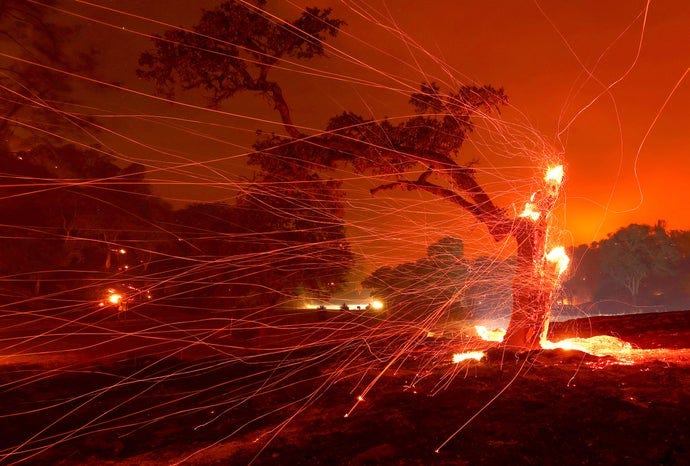Here in Seattle the air is murky, foggy; noxious. The night before last, when it was at its worst, I slept with my Kn95 mask on because I couldn’t stop coughing. I keep thinking about when I worked as a firefighter and breathed this kind of air all summer. There’s a particular moment I remember, on a fire in South Dakota, when I was hiking out of a canyon with my hotshot crew. We’d been working for nearly 24 hours trying to catch a fire. To hike back to our buggies, we needed to climb hundreds of feet to flat ground. It was night, and the smoke from the active fire had settled into the canyon with us, so thick we could see the beams of our headlights imprinted against the air, not the ground. We were all coughing. I told myself: if you pass out, it’s okay. I didn’t. But my throat and lungs hurt for the next few weeks.
The sensation of witnessing your own personal experiences, a niche set of experiences, become widespread and common, is jarring. Inhaling smoke was normal to me. But to everyone? It’s dangerous. The most difficult piece about watching this unfold, though, is knowing that much of it was preventable.
What if we had shifted more policies in the 1970’s, after A. Starker Leopold wrote the Leopold Report, which called for more natural fire to be introduced in National Parks? What if we had taken that more seriously, and funded the ideas behind it, not just in the National Parks? What if we had treated prescribed burning as an essential piece of “fighting fire”? What if we had stopped saying “fighting fire”?
The swagger of being a firefighter is intoxicating. You come in, you save things. You swing your tools and run your loud chainsaws. You get sweaty and dirty and exhausted. You bring your big machines: helicopters, bulldozers, airplanes. I can almost hear it in Hulk voice: Machine kill fire. I questioned this approach when I was a hotshot, but didn’t quite understand where my unease originated.

Justin Sullivan/Getty Images
I was a firefighter because I loved the challenge, the routine, and (most of all) being in the woods. Natural spaces were sacred to me (though now I realize, everywhere is “natural”). The smoke, the loud machines— all of that was excess. My favorite moments were the lulls: a quiet break in the middle of a forest, no trail in sight, the soft warm wind rustling pine needles, the smell of sap; the chirps of chipmunks and birds. Sometimes we ended up in places that hadn’t seen footprints in decades, or maybe ever.
Isn’t it ironic, that we use all these tools to “fight” fire, and these tools belch greenhouse gasses into the atmosphere, creating the likelihood for more fire? Isn’t it ironic that we scrunch of millions of small plastic water bottles to fill our own, and leave piles of trash and waste, trying to “save” our most sacred, wild places?
These places can kill us. Our planet can kill us. And she will, if we don’t stop prioritizing the Fire Industrial Complex.
This term came to me as I was writing this piece about using incarcerated people to fight fires. The Prison Industrial Complex was formed in order to profit from prisoners. The Fire Industrial Complex is the same. It’s not a term I made up: it’s been used before. There are billions of dollars tied up in fire. If there' aren’t big fires each year, the economic devastation can be thunderous. Just as people this fire season are losing everything, many are gaining: private contracting companies who send crews and equipment out to fires; gear manufacturers; fire camp kitchens; and especially: timber companies.
I wonder if timber companies are salivating, thinking of all the salvage logging they’ll get to do this winter.
I’m not necessarily saying that people profiting off fires is bad. But that we continually fail to enact new legislation, fail to prioritize restorative practices that could lead to less large summer fires— well, that is bad. We need to be adjusting our priorities. And, if we’re going to throw our money at something, it should be a solution.
My heart goes out to the thousands of people who have lost their homes in the midst of this pandemic. My hope is that we can find some solutions, so this doesn’t keep happening.




